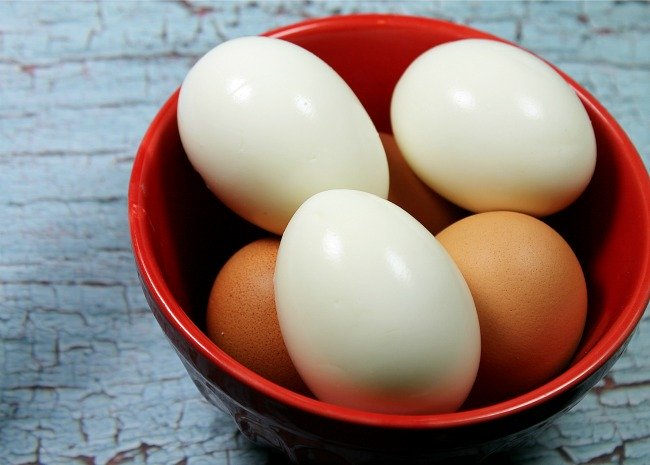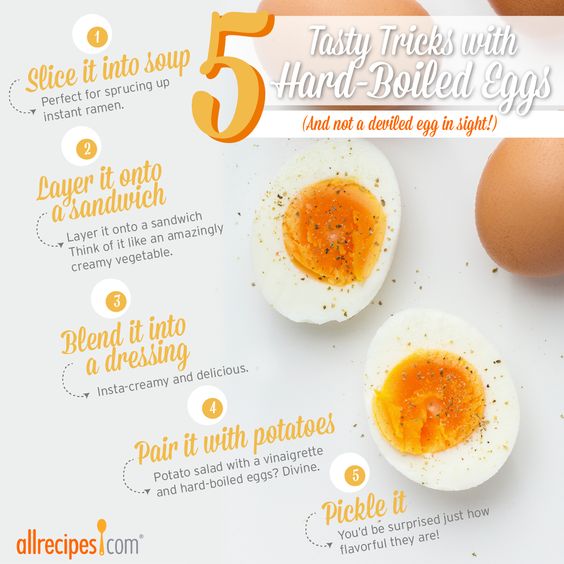How To Make Perfect Hard Boiled Eggs
What’s a perfect hard boiled egg? The whites are firm but not rubbery; the yolks are cooked but still creamy. Here’s how to boil an egg right.

Photo by Keni
The 4 steps to hard-boiling eggs for breakfast, salads, or Easter eggs.
1) Place eggs in a saucepan or pot and cover with cold water.
Eggs first, then water. Why? Because if you put the eggs in second, they might crack as they fall to the bottom of the pan. It’s no fun to learn this the hard way.
Also, very fresh eggs are delicious fried or scrambled, but older eggs are actually easier to peel. Your best bet for hard-boiled eggs is to choose eggs you’ve had in the refrigerator for a week or two.
2) Put pan over high heat and bring water to a rolling boil. Remove pan from heat and cover.
You want the water to come just to a boil, but not stay there. Eggs exposed to high heat for a long time go through a chemical reaction that turns the yolks green! So to answer the question “how long should I boil eggs?” The answer is pretty much not at all. And because the eggs don’t really cook in boiling water, some people prefer the term “hard-cooked eggs” to hard-boiled eggs.
Compared to a simmer, here’s what a rolling boil looks like.
3) Let the eggs stand in the hot water for 14-17 minutes.
How long you let the eggs stay in the water depends on how big the eggs are and how hard you want them cooked. To cook small eggs to medium, let them stand for 14 minutes. To cook extra-large eggs to medium, let them stand for 17 minutes. (We’re talking about chicken eggs here. You’re on your own with ostrich eggs.)
4) Drain eggs and put in a bowl filled with ice water.
The ice water isn’t just a nice-to-have; it cools the eggs down and prevents the green yolk problem. If you’re planning to peel the eggs, like if you’re chopping them for egg salad, crack them slightly before putting them in the ice water, and let them sit for an hour for maximum ease of peeling.
Ready to take a closer look? Here’s how to boil eggs, the movie.
Why does this method of hard-boiling eggs work? Because by bringing the eggs just to a boil, you can’t overcook them. You’ll never have to deal with dry, chalky, overcooked eggs with weirdly greenish yolks again. Nothing but beautiful bright yellow yolks and amazing texture for you!
So good you’ll want to eat them with just a sprinkle of salt. Here are some additional recipe ideas for your perfectly hard-boiled eggs:
- Egg Salad Recipes
- Deviled Eggs Recipes
- Easter Recipes
And here’s a cheat sheet full of tasty tricks for enjoying hard-boiled eggs sliced into soups, layered into sandwiches, blended into salad dressing, paired up with potatoes, and perfectly pickled!

Image by Allrecipes
Store any remaining hard-boiled eggs in the refrigerator in a covered container — the lid prevents odors from getting out into the fridge.
But wait, there’s actually one more way to hard-boil eggs. In the oven.
How to Hard Boil Eggs in the Oven
This method is just a bit unorthodox. It requires zero water — which, true, technically makes this method more hard-baking than hard-boiling. But stay with us here. Oven-baked “hard-boiled” eggs are just eggs heated up in a hot, dry oven. It’s a smart move when you’re making loads of eggs or stovetop space is at a premium. Pro Tip: Use a muffin tin to keep the eggs from rolling about in the oven. Here’s the technique in action:
Discover more egg info, including nutrition and safety tips, additional cooking methods, egg recipes, and more — it’s All About Eggs.